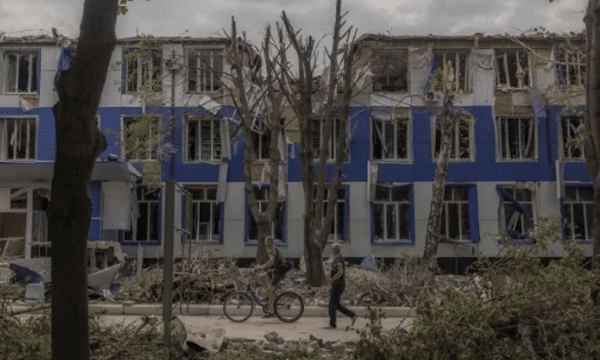Pokrovsk, in the northwestern corner of Donetsk region, is almost a Russian city again.
Established as a minor Russian rail junction in 1880, it was badly damaged by the Italians and Germans who captured the city between 1941 and 1943, killing more than 8,000 Red Army defenders, 5,000 residents, and all the Jews. After the war, the city, then named Krasnoarmeiskoye and later Krasnoarmeisk, more than doubled to a peak of around 80,000 in the last years of the Soviet Union. The city economy was based on the area’s mines which worked to dig out the largest coal reserves in the Ukrainian territory.
The coalmines were taken over in the post-1991 Ukrainian free-for-all by Rinat Akhmetov’s Metinvest group. Akhmetov, a Donetsk native and son of a coalminer, declared earlier this year:
Ukraine hopes Pokrovsk will feed its industry with coal for decades more from estimated reserves of 200 million tonnes. For that to happen, the country’s army must stop Russia’s creeping advance despite being hampered by ammunition shortages caused by a Republican-inspired halt to U.S. military aid and Europe’s failure to rapidly expand arms production.
Akhmetov dictated that from London where he owns many homes.
The defeat of the Zelensky regime in the Donbass has ended Akhmetov’s production chain of coal from Pokrovsk, coke from Avdeyevka, and steel from Mariupol. Pokrovske Coal has reported that from the first half of 2023 to the first half of this year, its mine output has dropped by 25%, from 1.6 million tonnes of coal concentrate to 1.2 million tonnes, “because of optimisation of mining operations amid changes in geological conditions.” Akhmetov’s annual production reports don’t reveal the volume of coal and coal concentrate produced at Pokrovsk.
He has engaged to a New York law firm to sue Russia for his losses.
The population of Pokrovsk city remained steady at about 60,000 in 2014 through 2021. It is now estimated to have dropped to 26,000 at the start of this month, when the Ukrainian military ordered the evacuation of civilians. Russian has been the native language of almost two-thirds of the population
Born in Pokrovsk and a resident of the city for 30 years, a professional psychologist and newspaper editor left the city ahead of the final battle between advancing Russian forces and the Ukrainian retreat. Her name is not published to protect family members who have remained. In the form of a question-and-answer interview, this is her story.
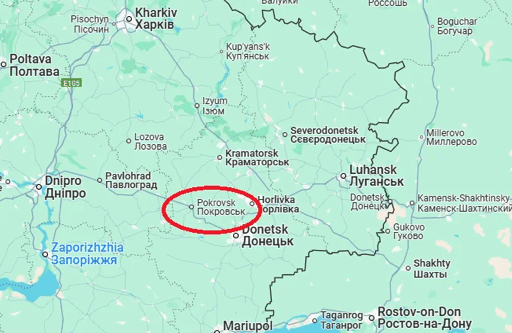
Located 66 kilometres northwest of Donetsk, the centre of Pokrovsk district and the city are located near the administrative border of the Dnipropetrovsk region of Ukraine. Together with the cities of Dobropolye, Mirnograd (Dymytrov), Novogrodovka, Selidovo and the smaller settlements adjacent to them, they form the Pokrovsky urban agglomeration (within the Pokrovsky district). According to Ukrstat, as of January 2022, the population of Pokrovsk was 60,127. In the middle of 2024, according to the statements of the city authorities, approximately 53,000-58,000 were living there. According to the last state census of 2001, the main ethnic groups were Ukrainians (75.04%) and Russians (22.09%). At the same time, Russian (59.84%) and Ukrainian (39.39%) prevailed linguistically. In addition to serving as a major railway junction, the M30 (E50) Pokrovsk- Karlovka-Donetsk highway passes through the city, as well as the T-0504 (H-32) Pokrovsk- Konstantinovka, the T-0515 Alexandrovka- Pokrovsk—Kostayantynopil, and the T-0406 Grigorovka-Mezhevaya-Pokrovsk highways.
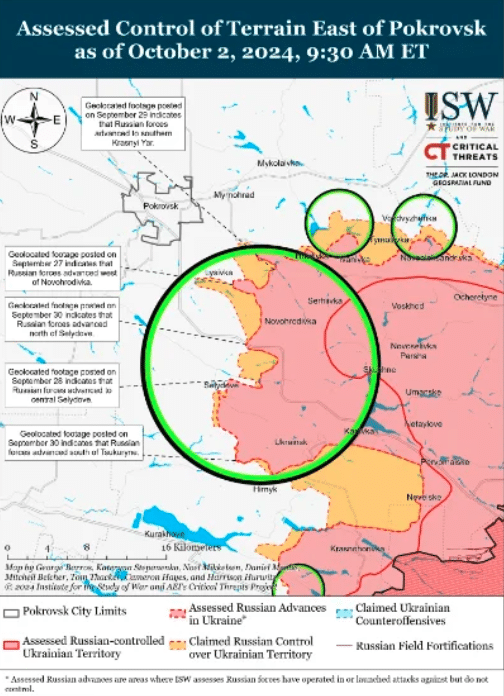
The leading edge of the Russian army’s westward advance on Pokrovsk is shown on this week’s Washington think-tank map as less than 5 kilometres from the outskirts of the city; click on source to enlarge. The sources for the map are reports by Russian military bloggers Boris Rozhin (Colonel Cassad), Mikhail Zvinchuk (Rybar), and Semyon Pegov (WarGonzo). For a review of their accuracy, read this. The strategic military importance of Pokrovsk is as a supply hub for the Ukrainian forces in the Donbass, including the cities of Toretsk (Dzerzhinsk), Konstantinovka and Chas Yar, as well as the Slavyansk-Kramatorsk agglomeration.
Q: What was the political orientation of your area and your family before 2014—towards Presidents Kuchma, Yushchenko, Yanukovich and Prime Ministers Azarov and Timoshenko?
A: Donbass was for Viktor Yanukovych. Since he comes from this region, he invested well in Donbass. Salaries, social benefits, and pensions were steadily paid. The indexing was timely. Not everything was perfect, but nevertheless, under Yanukovych it was the most stable time for Donbass. Yanukovych collaborated with Rinat Akhmetov, who owned many enterprises and mines in the region. Funds were also created to help the disabled, new cultural centers and temples were opened, and small businesses developed. At least in Pokrovsk, the situation was exactly like that.
Q: How did the Maidan protests and then the putsch in Kiev of February 2014 affect your living conditions in Pokrovsk?
A: The ordinary residents of Pokrovsk did not understand anything at first and did not attach importance. Many thought that it would not last long and would come to a peaceful solution. Information about the Kiev events was sketchy in Donetsk, but we learned about the fighting at Donetsk airport when wounded soldiers began to be taken to the hospital in the north of the city. However, already in 2014, roadblocks began to be set up at the exits from Pokrovsk. Both the soldiers of the Armed Forces of Ukraine and the military from the national battalions were on duty at them. On the part of the latter, there were frequent cases of robberies and murders of civilians. These cases did not reach the courts. But there were no “Nazis” in the city itself until 2022, only ordinary military patrols.
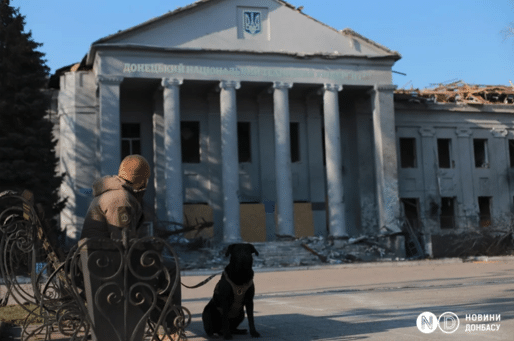
Donetsk Polytechnic University (Pokrovsk branch)
Q: How did the military actions from 2014 to 2022 affect Pokrovsk?
A: During this period, Pokrovsk existed as if nothing had happened. Occasionally Grad rockets flew to the outskirts, but surprisingly without casualties. That year, a new mayor was elected, who adjusted the work of all services, directing huge budget funds to the social development of the city. Pokrovsk is a rich city, as there are many mines and enterprises around, but before that, money was most often stolen. From 2014 anti-Russian propaganda, planted in Ukraine since the 1990s, became totally undisguised. The flow of misinformation was endless, especially about the May [2014] tragedy in the Odessa House of Trade Unions, but while access to Russian television and news resources was not blocked, residents regarded these news sources with great skepticism. They tried to erase all the past. For example, the possibility of renaming the central Shibankov Square to Lesya Ukrainka Square was seriously discussed. This is nonsense! Hero of the Soviet Union, who died during the liberation of Krasnoarmeysk (Pokrovsk) in 1943 and a mediocre poet, whose merit is only that she wrote in Ukrainian. Well, the wonderful poet Taras Shevchenko also wrote his poems in Ukrainian, why not name him after him, although he has nothing to do with the city at all.
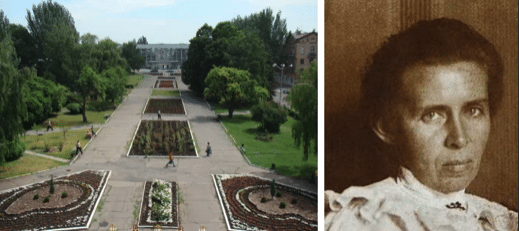
Left, Pokrovsk’s Shibankov Square. Right, Lesya Ukrainka (1871-1913)—an anti-tsarist Ukrainian Marxist , she never lived in Pokrovsk and had no family association with the city.
For twenty years now, open persecution of the Russian language, culture, and the Orthodox Church, has been under way. And for an area where more than 80% of the population consider themselves as Russians, this has been really hard.
Q: What were your expectations from the beginning of the Special Military Operation?
A: The Donbass has always been waiting for Russia, waiting for its protection and help. And in recent years, this has become especially strong. Of course, any military action is frightening–it is unnatural to normal human nature. But, as sad as it is to say, Ukraine deserved it and was heading for a similar outcome itself. The country cannot be a bargaining chip in the political game of other states and it is impossible to divide its citizens into people and “non-humans” because they speak a different language, especially in a region where representatives of different nationalities live—Russians, Ukrainians, Greeks, Bulgarians and others—who sincerely love both their home and the cultures of each other, but which—historically speaking—were united by the Russian language. Therefore, when the war began, many in Pokrovsk were relieved: “They will finally release us.” They thought that everything would pass quickly, but at the same time they knew about the preparations of the Armed Forces of Ukraine for defence, which had been made since 2014.
Q: How did life change in Pokrovsk after the start of the SMO?
A: There was no panic. In February 2022, the Armed Forces of the Russian Federation announced on the radio that they would attack only military facilities, weapons depots, clusters of equipment and armed formations. And when the shelling began in the same year, it was easy to determine who was shooting. The Russians always struck very accurately and only at objects where there is no civilian population. So when we see the news from the series “the enemy hit the kindergarten”, it means that there was a weapons depot in this kindergarten. The indiscriminate shelling is the work of the Armed Forces of Ukraine.
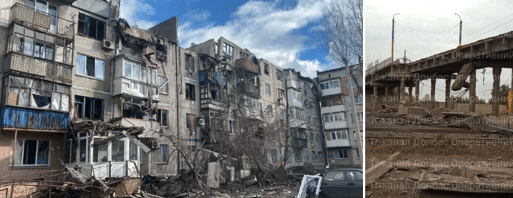
Source: https://t.me/infantmilitario/136004
There were three bridges in the city over the railway dividing it, there was only one left by the time I was leaving. [All bridges have now been destroyed.]
Is it useful for Russian troops to destroy roads and bridges that will help the offensive, simultaneously hitting communication towers and civilian facilities? Air alarms were activated after the shelling, which was illogical and only annoying. People are hiding in basements, but this is actually a trap, because if the structure collapses, it will bury everyone under it—the basements weren’t prepared as shelters. The Ukrainian armed forces started grabbing people on the streets as part of the “mobilization”. Even the miners, although they are a reserved occupations and have exemptions. Then Akhmetov intervened and they stopped taking people away. The mayor was removed and a military administration was set up. Many refugees passed through Pokrovsk—from Bakhmut, Avdeyevka, Soledar. There were cases when the Ukrainian security forces shot buses with refugees at western checkpoints.
Q: What happened in the city with the approach of the Russian army?
A: Over the past three months, “Nazis” have appeared in large numbers in the city. They don’t make defensive structures. Nothing like that—they just walk the streets, drive around in their armoured cars. It feels like they are waiting for some kind of military orders–we don’t know exactly what. The locals are afraid of them. Sometimes you can hear shooting in the streets, especially on the outskirts of the city—either there are clashes between the national guards and the soldiers of the Armed Forces of Ukraine, or the Nazis just got bored. Kindergartens and schools have been turned into warehouses of weapons and ammunition, In August, small shops and banks began to close. ATMs are working, but the priority for receiving cash is for the military. They receive a lot; ordinary residents do not always get money. There were gas outages. There is water and light only twice a day. Humanitarian aid which was sent to the city is being stolen and ends up on the shelves, where it is sold at exorbitant prices. In early September, the Pokrovsk-Lvov evacuation train stopped running; at that time very expensive tickets were required. And the attitude towards refugees from Donbass in western Ukraine is far from the best. Only the road to Pavlodar remains, but prices are also exorbitant there.
Many stay in the city because they are afraid of losing their homes, shops and other real estate. Also, there is simply no way to leave. But the only thing that scares the residents of Pokrovsk is not the arrival of the Russian armed forces, but the fact that after the retreat, the Armed Forces of Ukraine will start shelling the city and turn it into the same ruins as Bakhmut and Avdeyevka.
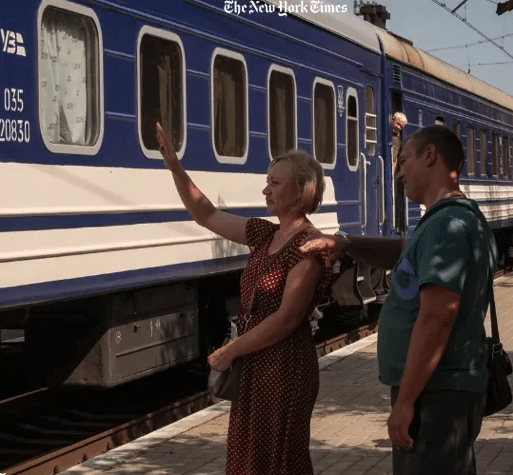
In the New York Times version of the evacuation of Pokrovsk, written by Andrew Kramer, artillery bombardment of the city will come, not from the retreating Ukrainian army but from the advancing Russian forces. For many years Kramer failed to be promoted at the Times bureau in Moscow but became chief of the organ’s Kiev bureau in 2022. From Pokrovsk Kramer reported: “Now, it is too late to ensure that Pokrovsk will be protected from artillery bombardment, the town’s military administrator said….Russian forces since April have ground through five defensive lines east of Pokrovsk, said Serhiy Dobryak, the town’s military administrator. With only two more lines remaining, the incursion into Russia, and the potential diversion it might cause, was essentially a last hope…The town for now is not at risk of imminent capture, he said, but officials expect a sustained artillery bombardment that is likely to leave it in ruins. That has been the fate of other Ukrainian towns like Bakhmut and Avdiivka that Russia pummeled into rubble before forcing Ukraine to pull back. ‘They will bring the artillery nearby and they will destroy the town,’ Mr. Dobryak said. “That will happen.’ ”

